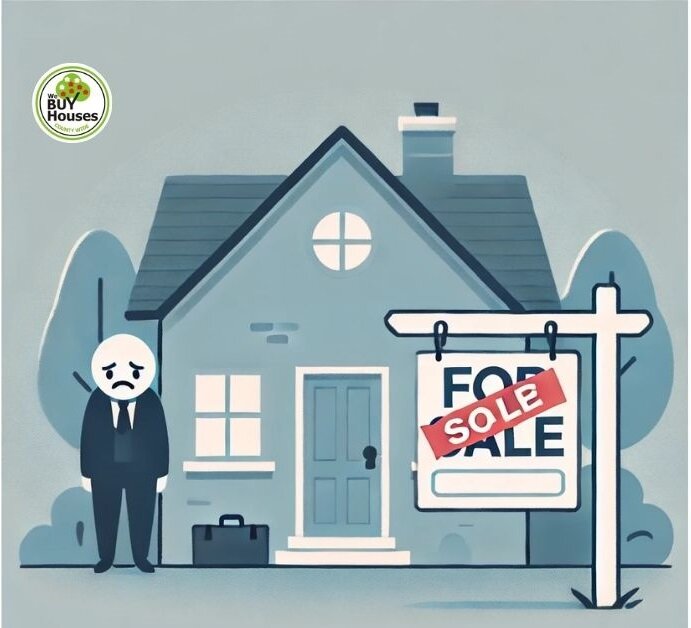
Selling a house with difficult tenants can be quite challenging. When tenants cause issues such as unpaid rent, property damage, or constant complaints, it can complicate the selling process. Despite these obstacles, there are strategies to successfully sell a property even with challenging and bad tenants. This guide provides practical solutions for Selling House with Bad Tenant while keeping your legal obligations and tenant rights in mind.
Understanding the Basics of Selling with Bad Tenants
Dealing with tenants who damage property or refuse to cooperate during showings makes selling more complex. However, landlords still have the right to sell their properties. Understanding the tenants’ rights, lease agreements, and legal processes will help ensure compliance and a smoother selling process.
Can You Sell with a Tenant in Place?
Yes, you can sell a property even if tenants are still living there. The main challenge is the type of tenancy agreement in place. If tenants are on a fixed-term lease, they have the right to stay until the lease ends. In contrast, month-to-month tenants can be given notice, making it easier for a potential buyer to gain occupancy.
How to Sell a House with Bad Tenants
Selling a House with a Bad Tenant involves strategic planning and clear communication. Start by reviewing the lease agreement to understand your legal position. If the tenant has violated the terms, you may have grounds for eviction. However, pursuing a cooperative approach is often more effective. Engage the tenant in open discussions about the sale and offer incentives like rent reductions or moving assistance. Consider options like “Cash for Keys” to encourage a voluntary move-out. If the tenant remains, prepare for potential challenges during showings and be transparent with buyers about the tenant’s situation to avoid surprises and ensure a smooth transaction.
1. Review Your Lease Agreement First
Before making any move, understand the lease agreement. If the tenants have violated terms, such as not paying rent or damaging the property, you may have grounds for eviction. In some cases, tenants may agree to leave early in exchange for compensation.
2. Communicate Openly with Tenants
Effective communication can make a significant difference. Explain your plans to sell and address tenants’ concerns. Offering incentives like rent reductions or moving assistance can encourage cooperation. This approach can be especially useful when Selling a House with a Bad Tenant who is otherwise uncooperative.
3. Consider Offering ‘Cash for Keys’
“Cash for Keys” is a strategy where you offer tenants money to leave voluntarily. This can expedite the process, minimize legal hassles, and help you prepare the property for sale more quickly. Although it’s an upfront cost, it might be less expensive than a lengthy eviction process.
4. Prepare the Property for Sale
Improving the property’s appearance can attract more buyers. If repairs are feasible, address any damage caused by the tenants. Clean the property and ensure it’s presentable for potential buyers, even if tenants still live there.
Should You Evict Tenants Before Selling?
Evicting tenants can be an option, but it should be approached carefully. Legal eviction processes can take months and may slow down the sale. If the tenant’s behavior severely impacts the property’s value, eviction might be necessary. Consult with a legal professional to ensure compliance with local laws before proceeding.

Selling to Real Estate Investors

Selling to real estate investors is a viable option when dealing with problematic tenants. Investors typically buy properties “as-is,” making them ideal for sellers looking to offload quickly. These buyers are familiar with tenant-related issues and can handle eviction processes or lease negotiations, reducing stress for sellers. The transaction is often faster, as investors prioritize efficiency and are more flexible in terms of occupancy. While offers might be below market value, the benefits include immediate payment, less risk, and the ability to close the deal quickly, which is especially useful for those urgently needing to sell properties with bad tenants.
1. Find a Real Estate Investor
One of the easiest ways to sell a house with difficult tenants is to find a real estate investor. Investors often buy properties “as-is,” making them an ideal option when Selling House with Bad Tenant. They are typically experienced in handling tenant issues and may offer a quicker, hassle-free sale.
2. Auction the Property
Auctions can be another option. While prices might be lower, it guarantees a quicker sale and eliminates tenant-related complications.
3. Work with Home-Buying Companies
Home-buying companies specialize in purchasing properties with tenants, including difficult ones. They often provide cash offers and handle all legalities, reducing stress for the seller.
Legal Considerations When Selling a House with Tenants

When selling with tenants in place, landlords must adhere to tenant rights and legal regulations. Tenants are entitled to “quiet enjoyment,” meaning they should not face constant disruptions during the sale. Landlords need to provide proper notice before showings and must honor the lease terms unless legal grounds for eviction exist, such as lease violations or unpaid rent. Evictions must follow state and local laws, which can be complex and time-consuming. Consulting with a real estate attorney is advisable to ensure compliance, minimize legal risks, and manage tenant relations effectively throughout the selling process.
When selling with tenants in place, landlords must respect tenant rights:
- Right to ‘Quiet Enjoyment’: Tenants are entitled to live peacefully without constant disruptions, even if the property is on the market.
- Eviction Laws: If eviction is necessary, landlords must follow the correct legal procedures, which vary by state.
- Proper Notice: Provide tenants with proper notice before showings or property evaluations, as stipulated in the lease agreement.
Handling Tenant Objections During the Selling Process
Some tenants may actively resist showings or provide negative feedback to potential buyers. Here are a few tactics to manage this:
- Offer Incentives: Consider offering a rent reduction or other perks to encourage cooperation during the selling process.
- Arrange Convenient Showings: Schedule showings at times that suit the tenants’ availability to reduce tension and inconvenience.
Setting a Realistic Price for Properties with Bad Tenants
Pricing a property with bad tenants requires a strategic approach. The presence of problematic tenants can lower a property’s perceived value, so it’s essential to be realistic about pricing. Start by conducting a market analysis to understand comparable property values in your area. Factor in the potential costs of eviction, legal fees, and repairs needed due to tenant damage. While the sale price may be lower than market value, it should reflect the challenges involved, attracting investors or buyers willing to handle tenant issues. Competitive pricing increases interest and shortens the selling timeline, making it easier to close the deal.
1. Adjust the Price for Condition and Tenancy
When selling a property with problematic tenants, consider setting a lower price to attract buyers who are willing to take on the challenge. Be transparent about the tenant situation to avoid surprises.
2. Conduct a Cost-Benefit Analysis
Calculate potential costs, including eviction expenses, legal fees, and repairs, to decide on a realistic selling price. It’s better to price competitively rather than hold out for a high offer that may not come.
Alternative Solutions Beyond Eviction
If eviction seems too complex, consider these options:
- Negotiate an Early Lease Termination: Offer tenants a financial incentive to end the lease early.
- Rent-to-Own Agreements: If the tenant is interested, a rent-to-own agreement could be a viable solution that benefits both parties.
The Bottom Line
Selling a property with problematic tenants can be challenging, but it’s manageable with the right approach. Understanding tenant rights, effective communication, and legal compliance are crucial for a smooth sale. Pricing the property realistically, considering “Cash for Keys” agreements, or working with real estate investors can increase the likelihood of a successful transaction. Although eviction may be necessary in severe cases, cooperative solutions are often more cost-effective and faster. Remember, each tenant situation is unique, and adapting your strategy accordingly can make the process easier. Selling to home-buying companies is a practical option if you need a quick sale, as they buy properties “as-is” and manage tenant issues on their own.
Ready to move forward despite tenant issues? Consider a tailored approach based on your specific circumstances and start planning your next steps toward a successful sale today.

Kevin J Roberts
Licensed Real Estate Broker & Investor
Kevin Roberts is a seasoned real estate expert with 40+ years of experience, excelling
in property investments, sales, and client satisfaction in the State of California.
.
FAQs
1. Can I sell my house if the tenant refuses to leave?
Yes, you can still sell your house, but the buyer will need to honor the existing lease or begin eviction proceedings themselves.
2. Is it better to evict tenants before selling?
While eviction can make the property more marketable, it may extend the selling timeline. Consider eviction only if tenants are severely hindering the sale.
3. What is ‘Cash for Keys’?
“Cash for Keys” is an agreement where the landlord offers tenants money to move out voluntarily, avoiding a formal eviction process.
4. Do I need to disclose tenant issues when selling?
Yes, in many states, you must disclose known tenant issues to potential buyers.
5. Can I sell my house directly to an investor?
Yes, selling directly to an investor is often the quickest way to sell a house with bad tenants. Investors are familiar with tenant-related challenges and can offer a faster, cash-based transaction.
Resources:
The Duplex Doctors: https://www.theduplexdoctors.com/blog/selling-a-rental-property-with-a-bad-tenant
Nolo: https://www.nolo.com/legal-encyclopedia/tips-selling-property-with-existing-tenants.html
Connect Home Buyers:https://connecthomebuyers.com/attention-landlords-heres-how-to-evict-bad-tenants-to-sell-a-rental-property/

Kevin J Roberts
Licensed Real Estate Broker & Investor
Kevin Roberts is a seasoned real estate expert with 40+ years of experience, excelling
in property investments, sales, and client satisfaction in the State of California.

